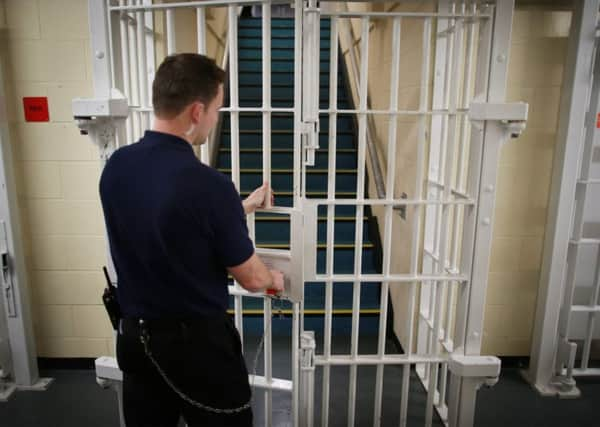‘Tough’ stance on crime and imprisonment fails to get results – Yorkshire Post letters


DOES getting ‘tough on crime’ reduce crime? And how is that we have the highest imprisonment rate in Western Europe (142.4 prisoners per 100,000 population) and a reoffending rate of 46 per cent?
Advertisement
Hide AdAdvertisement
Hide AdWith one of the highest imprisonment rates in the world (655 per 100,000 population) and amongst the highest reoffending rates in the developed world (reported between 43 and 77 per cent) the US serves as a stark warning of the impact of getting tough on crime.
Exclusive: I’m deeply concerned about knife crime across Yorkshire admits Home Secretary Sajid Javid
Rather than continuing prison expansion, what can we learn from the criminal justice systems of other countries? Norway (incidentally a country often given as an example of how we could be outside of the EU) has a low imprisonment rate (63 prisoners per 100,000 population) and despite what many would criticise as ‘cushy’ prisons it has one of the lowest re-offending rates in the world (20 per cent).
Advertisement
Hide AdAdvertisement
Hide AdWhat if our natural tendency to be tough on crime is costing us dearly – putting our prison workers in increasingly dangerous situations, reducing the likelihood of effective rehabilitation and inadvertently increasing crime? Has the Government forgotten Lord Woolf’s recommendations following the most comprehensive review of the prison system in over 100 years after the Strangeways riots in 1990? One of which was that prisons should be small (no more than 400 places). Norway’s largest prison has a capacity of around 350 prisoners.
If we want to reduce crime, will the Government have the courage to review their approach to prison reform in light of the early outcomes from the ‘flagship’ new mega-prison at Wrexham where assaults on staff and use of force incidents by staff against prisoners are higher than other Category C prisons? And will we, as individuals, have the courage to support more recent Government proposals to reduce the use of short sentences in line with the evidence showing that this reduces reoffending?
Missed chance to cut carbon
From: Richard Wood, Farnley Tyas.
AMIDST all the concern about the urgency of climate change action, it is interesting to note that a statement from Defra recently published more realistic statistics which included UK consumption emissions.
These include, for example. the carbon from the steel we now import from China after Redcar closed (at a cost of 2,000-plus jobs). We doubled our coal imports from Russia (loss of 50,000 jobs over the last 10 years and we still have 200 years of coal in the ground) with a five-fold higher carbon footprint compared with coal mined in the UK.
Advertisement
Hide AdAdvertisement
Hide AdAdded together, our actual carbon reductions since 1997 are 3.4 per cent. And we think we can reduce them by 1,100 per cent in the next 30 years?
About 80 per cent of the world’s energy use still comes from oil, coal and gas. If we want global emissions to fall, we need to decarbonise to carbon capture and storage. Developing this technology, and making it pay, is something other countries might buy from us. We were nearly there until David Cameron and George Osborne cut the budget.
Meaningless targets, misinformation and virtue signalling on the other hand should simply be ignored.
From: Peter Hyde, Driffield.
I SEE the Robin Hood Airport is spending a massive amount of money building a solar farm in an effort to reduce its carbon footprint. I am afraid that whatever commendable savings they may succeed in making will be cancelled out as more and more flights are made in and out by gas-guzzling aircraft as the popularity of the airport increases. Still I suppose it is worth making an effort.
Country over county
From: Elisabeth Baker, Leeds.
Advertisement
Hide AdAdvertisement
Hide AdYOUR caption to the picture of Jonny Bairstow playing for England on the front page (The Yorkshire Post, July 1) refers to him as “the Bradford-born batsman, who also plays for Yorkshire County Cricket Club”. This says it all.
In the past, he would have been described as a Yorkshire player who also plays for England. In these days of central contracts, when England players need to have permission to play for their own counties, such permission is often denied – even if the player is not required by England.
It is time that the authorities remembered where a player’s talents were nurtured and honed, to the national team’s benefit. Bairstow is rarely made available to the White Rose county team. I despair.
Power failure over rail stock
From: ME Wright, Harrogate.
PACERS are set to go rattling on beyond their promised scrapping date (The Yorkshire Post, July 1). Some ‘Northern’ no-name claims that, as a substitute, the slumbering ‘Crossrail’ stock “may not be compatible with the rail infrastructure here”.
Advertisement
Hide AdAdvertisement
Hide AdThere’s no “may” about it. Crossrail’s trains are state-of-the-art electric. The North’s ‘Pacer’ lines are anything but – despite the duplicitous electrification carrot dangled before us, prior to the 2015 election. Northern seem to have overlooked this; another attack of what I recently saw most aptly described as “FailingGraylingitis” perhaps?
Can’t have it both ways
From: Hilary Andrews, Leeds.
SO the Duke and Duchess of Sussex want an ordinary life for their son Archie. How about moving them out of their expensive home paid for by taxpayers? Put them in a council house and let Archie go to a comprehensive school then.